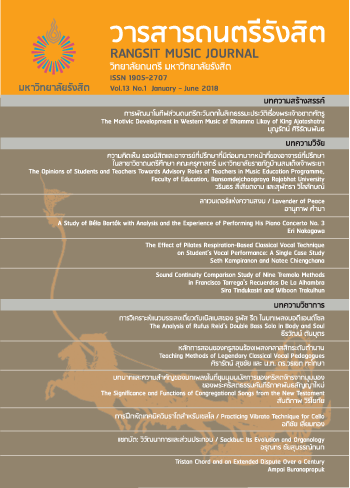The Opinions of Students and Teachers Towards Advisory Roles of Teachers in Music Education Programme, Faculty of Education, Bansomdejchaopraya Rajabhat University
Keywords:
Massive Open Online Course (MOOC), application, Thai communication skill, Chinese studentAbstract
This study aimed to 1) investigate the opinions of students and advisors towards the roles of advisors in Music Education Program, Faculty of Education, Bansomdejchaopraya Rajabhat University, and 2) provide guidelines on the roles of advisors in Music Education Program, Faculty of Education, Bansomdejchaopraya Rajabhat University. The sample group of the study was comprised of the first-to-forth-year students and the lecturers of Music Education Program, Faculty of Education, Bansomdejchaopraya Rajabhat University in total of 345 participants. The findings revealed that firstly in the aspect of the roles of advisors in Academic Affairs, Student Development, Interaction with Students, and Student Assistance, students were satisfied with the roles of advisors in the high level in every aspect. Secondly, guidelines for the roles of advisors were categorized into 4 aspects: in the aspect of Academic Affairs, advisors were able to explain the structures of curriculum, and advisors could help students enroll their courses correctly and advise them how to set their goals before internship and for their future. For Student Development, advisors should be good role models for students in the aspects of personality, manner, responsibility, and selfrecognition. Also, advisors should possess good attitudes towards the program and people. In the aspect of Interaction with Students, advisors should create a good atmosphere, such as friendliness, and confidence to students when needing consulting. Advisors critically gave knowledge, advice and guidelines for solving problems. Finally in the aspect of Student Assistance, advisors should care for all students they had been assigned closely, call students for meeting when there was a problem or when they encountered difficulties individually to find out the solution of a problem, and cooperate with other organizations in order to help solve problems of students.
References
2. ณัฐมน พันธชาตร. “การศึกษาบทบาทอาจารย์ที่ปรึกษา: กรณีศึกษา วิทยาลัยราชพฤกษ์.” สารนิพนธ์การศึกษามหาบัณฑิต, สาขาการบริหารการศึกษา, มหาวิทยาลัยนเรศวร, 2552.
3. ณรุทธ์ สุทธจิตต์ อภิภา ปรัชญพฤทธิ์ และปัทมศิริ ธีรานุรักษ์ จารุชัยนิวัฒน์. “ความคิดเห็นของนิสิต และอาจารย์ที่ปรึกษาเกี่ยวกับบทบาทของอาจารย์ที่ปรึกษา คณะครุศาสตร์จุฬาลงกรณ์ มหาวิทยาลัย.” ทุนวิจัยคณะครุศาสตร์, จุฬาลงกรณ์มหาวิทยาลัย, 2548.
4. ธงชัย วงศ์เสนา. “บทบาทอาจารย์ที่ปรึกษา.” วารสารสํานักวิทยบริการและเทคโนโลยีสารสนเทศ มหาวิทยาลัยราชภัฏสุรินทร์ 4, 4 (2552): 33-37.
5. ประเสริฐศรี ธรรมวิหาร. “การศึกษาเปรียบเทียบความคาดหวังและสภาพที่ปฏิบัติจริงเกี่ยวกับ บทบาทของอาจารย์ที่ปรึกษา สถาบันราชภัฏบ้านสมเด็จเจ้าพระยา.” วิทยานิพนธ์ครุศาสตร- มหาบัณฑิต, สาขาการบริหารการศึกษา, มหาวิทยาลัยราชภัฏบ้านสมเด็จเจ้าพระยา, 2546.
6. พิชิต ทองประยูร. “บทบาทและสภาพของการปฏิบัติงานอาจารย์ที่ปรึกษาตามความคิดเห็นของ นักศึกษาและปัญหาการปฏิบัติงานที่ปรึกษาของอาจารย์ที่ปรึกษาในมหาวิทยาลัยราชภัฏ หมู่บ้านจอมบึง.” วิทยานิพนธ์ครุศาสตร์มหาบัณฑิต, สาขาการบริหารการศึกษา, มหาวิทยาลัยราชภัฏหมู่บ้านจอมบึง, 2547.
7. พนิดา ประเทือง. “บทบาทที่เป็นจริงและที่คาดหวังของอาจารย์ที่ปรึกษาในทักศนะของนักศึกษา ระดับปริญญาตรี คณะบริหารธุรกิจ มหาวิทยาลัยแม่โจ้.” วิทยานิพนธ์ศึกษาศาสตรมหาบัณฑิต, สาขาการบริหารการศึกษา, มหาวิทยาลัยเชียงใหม่, 2552. มหาวิทยาลัยราชภัฏสุราษฎร์ธานี.
8. คู่มืออาจารย์ที่ปรึกษา. กองพัฒนานักศึกษา, สํานักงานอธิการบดี, มหาวิทยาลัยราชภัฏสุราษฎร์ธานี, 2555.
9. สุมาลัย วงศ์เกษม. “บทบาทของอาจารย์ที่ปรึกษาสถาบันราชภัฏอุบลราชธานี.” ทุนวิจัยจากสถาบัน ราชภัฏอุบลราชธานี, มหาวิทยาลัยราชภัฏอุบลราชธานี, 2546.
10. สํานักงานคณะกรรมการการศึกษาแห่งชาติ. พระราชบัญญัติการศึกษาแห่งชาติ พุทธศักราช 2542. กรุงเทพฯ: สํานักนายกรัฐมนตรี, 2542.
11. Levine, Mark. The Jazz Theory Book. Petaluma, CA: Sher Music, 1995.







